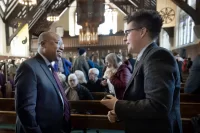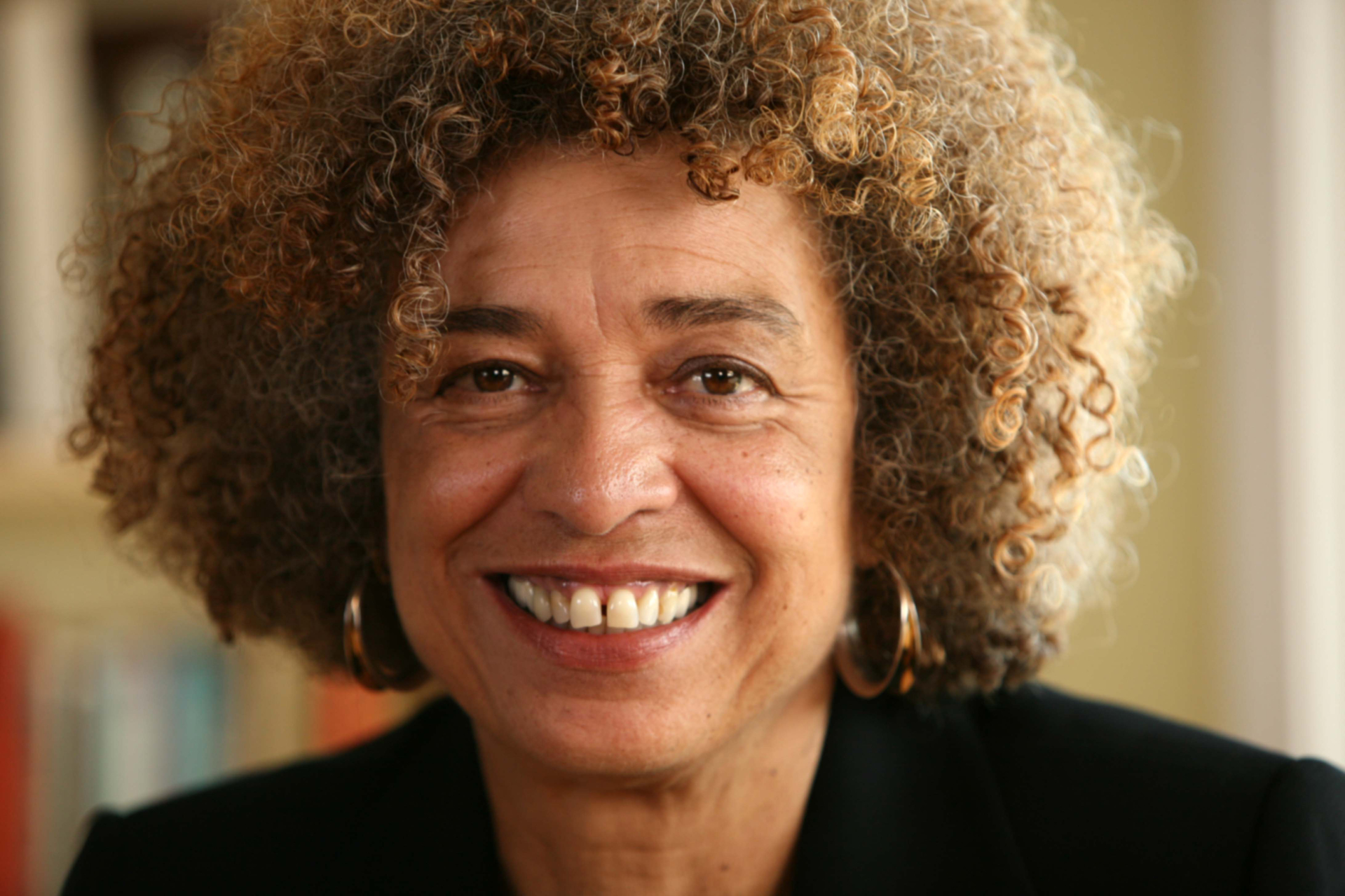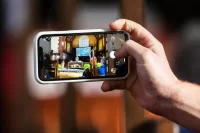
When Therí A. Pickens, chair of Africana and professor of English, got the request from faculty colleague Michael Sargent asking her to interview this year’s Martin Luther King Jr. Day keynote speaker, famed activist and author Angela Y. Davis, she hit reply before even finishing reading the request from Sargent, an associate professor of psychology and co-chair of the college’s MLK Day Planning Committee.
“I was like, ‘Absolutely. Done. Sign me up.’”
Pickens is a busy woman, working on her first poetry collection, among other things, but she dropped what she was doing to reread Davis’s work in preparation for the talk, which was prerecorded on Jan. 5 and will be livestreamed at 9 a.m. on Monday, Jan. 18. As Pickens puts it, “You say no to some things so you can say yes to that one.”
How to Join MLK Day at Bates
Under the theme “Confronting Our History; Justice for Coming Times,” this year’s MLK Day events, including the keynote and workshops, will be offered virtually. The prerecorded event will be shared starting at 9 a.m (no registration is required). Requiring pregistration, workshops on Sunday and Monday, required, are open for Zoom attendance.
Monday’s keynote kicks off with welcomes from President Clayton Spencer and Bates Student Government co-Presidents Perla Figuereo ’21 of the Bronx, N.Y., and Lebanos Mengistu ’21 of Somerville, Mass.
Davis is Distinguished Professor Emerita of History of Consciousness and Feminist Studies at the University of California, Santa Cruz. But the term many use to describe her, including Sargent’s co-chair on the MLK Day committee, assistant professor of history Andrew Baker, is “icon.” In 2020, when Time produced its “100 Women of the Year” feature, a list looking back over the past century, Davis was named Woman of the Year for 1971.

“She has been an icon for so long,” Baker says. “She can speak to the struggle for racial justice over a 50-, nearly 60-year period, being at the very forefront of it.”
One of Baker’s courses, “Black Resistance from the Civil War to Civil Rights,” directly addresses Davis’s work, so it was a “dream” scenario to have Davis say yes to Bates’ invitation, he says.
Attending the keynote recording session was personally rewarding for Baker — “to be able to just sit back and feel like you’re learning from somebody who’s done everything that there is possible to do, and who has mobilized in every way possible and has been at the forefront of these struggles.” Now he’s looking forward to it being shared with the full Bates community Monday.
Students, faculty and staff were invited to submit their names to participate in the event, with a limit of 55. Unsurprisingly, those spots filled up quickly.
“To me she’s almost the prophetic figure, right?”
Andrew Baker, assistant professor of history and co-chair of the MLK Day Planning Committee
“Even if you haven’t read a book by Angela Davis, or even listened to an interview with Angela Davis, you know who Angela Davis is,” says Joshua Redd ‘21 of Brooklyn, N.Y., who, as president of the Bates Black Student Union, has the honor of introducing Davis as the keynote speaker. Noelle Chaddock, vice president for equity and inclusion, serves as moderator.
Thirty years ago, the civil rights activist and scholar made her first, memorable visit to Bates, on Jan. 16, 1991, speaking to a full house in the chapel just as the country was entering the Persian Gulf War and just two days before the faculty voted to cancel classes for the first time to observe MLK Day.
At the time, she had just published Women, Culture, and Politics, and she has since published five more books, including the 2003 work Are Prisons Obsolete? “The book is really packed with amazing information,” Redd says. “It’s valuable information that I think everybody could benefit from. She explains herself so easily and so concisely.”
Are Prisons Obsolete? will serve as a springboard, along with Abolition for the People, a set of essays convened last year by Colin Kaepernick, for a live workshop session called “Abolition: A World Without Policing and Prisons,” taking place at 10:45 a.m., immediately after the keynote.
Davis’s scholarship on the carceral state is world renowned and hard-won; she experienced incarceration firsthand in the early 1970s, when she was held in jail for over a year on felony charges for which she was later acquitted. In 1997 she was one of the founders of Critical Resistance, which aims to dismantle the prison system, not just in America, but worldwide.
“If you look over her career, she’s been ahead of the conversation on race in ways that America has only caught up to her in, often a few decades later,” Baker says. “To me she’s almost the prophetic figure, right?”
For Pickens, the challenge of preparing for Davis’s keynote was not just to reread seminal works by Davis, first encountered during her time as a graduate student at UCLA — “I wanted to kind of live in her words a bit” — but to make a bi-coastal Zoom feel like a real conversation. “I don’t like it when interviewers kind of pump people for information.”
Pickens’ aim, then, was not to be like Barbara Walters or Diane Sawyer but more Gayle King or Oprah Winfrey. “Let’s sit on the couch and talk.” She found Davis to be “incredibly gracious” in thought and conversation, especially with the students who were invited to take part and ask questions in the session.
Redd used the word “mesmerizing” to describe the experience of being in Davis’s presence. Redd is also directing the Sankofa program, the culminating event of the college’s two-day MLK celebration. Typically the event is a live performance, featuring music and dance, but this year’s program, “Sankofa: Embracing Diasporic Conversations,” will bring Black people together to engage in “serious, radical thoughts and imaginations” with a panel of current and past Bates students as well as some faculty.
The talk, Redd says, will be about work that matters. “About how to keep ourselves involved with this work that needs to essentially change the world,” he says. “How we, as Black people in this world, come about making that change and being the change seekers of the world.”




